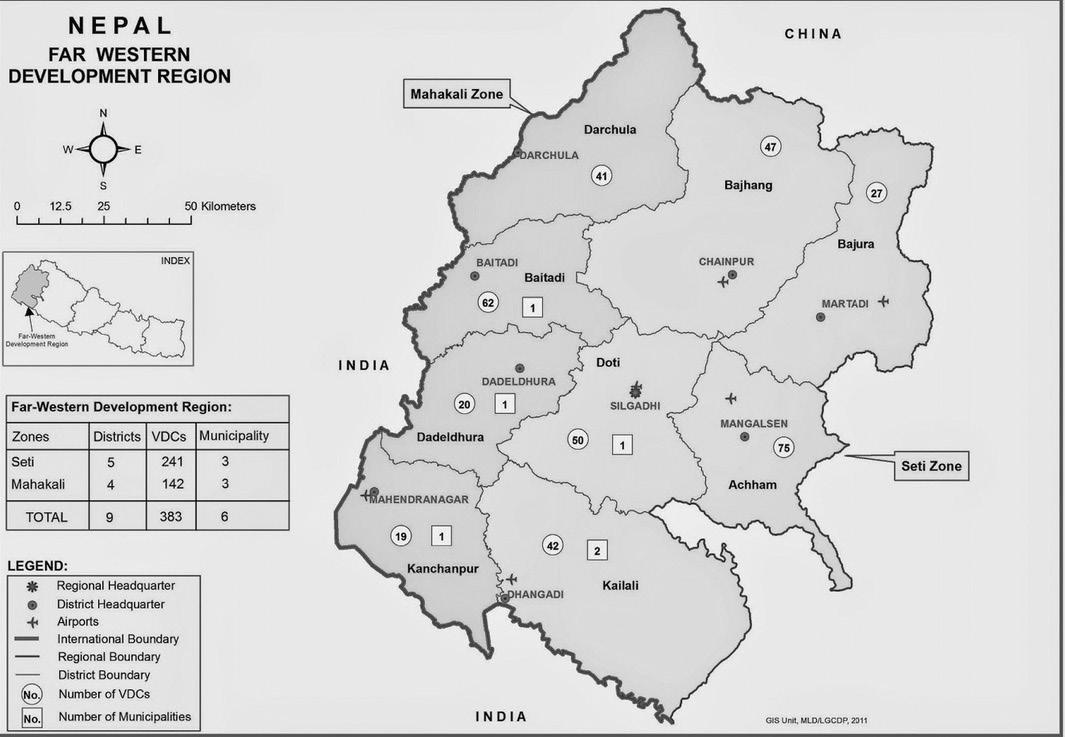public transparency. The group should work together with the locals as well as government officers in specific projects. These TFs should be monitored by the Ministry of Women, Ministry of Education, and Commission for the Investigation of Abuse of Authority.
5. External Accountability and Transparency Nepal has been receiving foreign aid from external developmental partners (EDPs), including foreign governments, multi-laterals, and INGOs for majority of its developmental projects. The country is aid-dependent for policy-making, program design, and implementation.32 NGOs in Nepal have made significant contributions in the areas of children’s rights, women’s rights, and the trafficking of girls.33 INGOs and NGOs working in the mid- and the far- western region can use EDPs as leverage to further increase their role in policy-making. It does not imply using donations to encourage a Western way of living. International donors can incorporate transnational feminist approaches in their work. INGOs can partner with local non-profits, women’s organizations, and various InterGovernmental Organization (IGOs) to condemn sexist oppression in the region. For example, Save the Children is an INGO working to end CP in every district of the region. They understand that the causes of child marriage and CP are interconnected.
RECOMMENDED COURSE OF ACTION All above mentioned solutions have a potential to eradicate CP from the region. However, a plan of action that combines Option 1– Status Quo with Stricter Implementation– Option 2– Addressing the Lack of Education and Creating a New Education System for the Region– and Option 4– Assembly of Task Forces Focused on Eradicating Gender-Based Discrimination in Western Nepal and Focused on Educating Girls in Western Nepal is recommended.
Women of far-western region are deprived of basic human rights as well as other constitutional rights. CP has both religious and patriarchal roots. Addressing this issue requires a transnational approach, which means that the solutions should aim to understand the culture and people of the area before condemning the way of life. CP is already illegal, and the 2017 criminalization act was a major step against it. The government now should just focus on its effective implementation. Violation of constitution is a crime and anyone supporting the crime should also be charged as a criminal. Local police force and government officers must be held accountable by the central and local governments. Task forces, discussed in option 4, can be an internal accountability check mechanism for the central Government. The focus shouldn’t be just on the law but also the lawmakers and stakeholders. The region needs a better education system as the current one fails to address the problem of illiteracy in far-western Nepal. Educating women is not just a solution to eliminate CP, but, to a numerous series of problems like domestic violence, child marriage, sexual assault, and human trafficking. Just like the women have a right to education, they also have a right of choice and religion. Women should be allowed to follow their culture and respect their faith, if that’s what they choose to do. However, women should be provided with the opportunity to gain that ability of decision making.34 Rights come with an understanding of duties and responsibilities to the society. Nepalese women in the region are denied their rights and yet require fulfilling all their responsibilities to the society. The lawmakers in the country must address this injustice.
32 Rajendra Karkee and Jude Comfort, “NGOs, Foreign Aid, and Development in Nepal,” Frontiers in Public Health 4 (2016), https://doi.org/10.3389/ fpubh.2016.00177.
CP is not just a gender issue; it is a result of many interconnected complexes and biases of the society tied together to disadvantage the women of the region, in a worse way possible. The patriarchy and superstition deeply rooted in the rural areas of far western Nepal make it challenging to address it. We are so accustomed to western way of living that sometimes understanding a problem in the global South requires a deeper dive. Education and
33 Iibd.
34 Khader. Pg., 76–97
Vol. 12, Issue 1
December 2020
57





